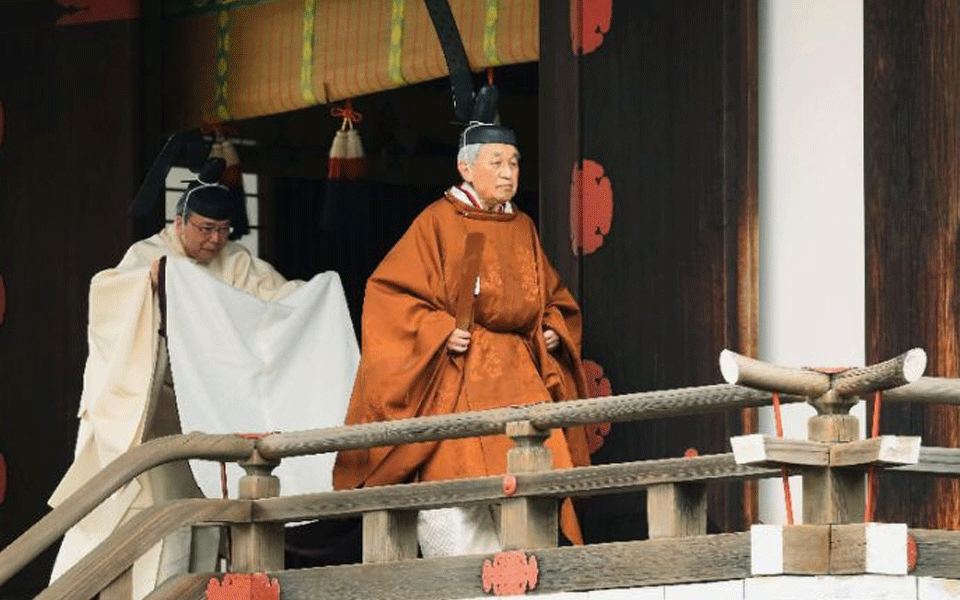Tokyo: Draped in ornate golden-brown robes and wearing a towering black hat, Japan's Emperor Akihito on Tuesday kicked off ceremonies for his abdication, the first in 200 years for the world's oldest monarchy.
Akihito is handing over the Chrysanthemum Throne to his eldest son, 59-year-old Crown Prince Naruhito, in a series of solemn rituals that also usher in the new imperial era named "Reiwa" - meaning beautiful harmony - that will last throughout the new monarch's reign.
As crowds began to gather early Tuesday in drizzle outside the sumptuous Imperial Palace in central Tokyo, Akihito performed a ritual to "report" his abdication to his ancestors and the Shinto gods at several "sanctuaries".
But the main event will be at 5:00 pm local time, when the 85-year-old Akihito will formally step down in a 10-minute ceremony in the "Matsu-no-Ma" ("Room of Pine"), considered the Imperial Palace's most elegant hall.
The ritual will be conducted in the presence of the imperial regalia - an ancient sword and jewel - considered crucial evidence of an emperor's legitimacy.
However, Akihito nominally remains emperor until the stroke of midnight and Naruhito "inherits" the regalia at a second ceremony Wednesday at 10:30am, making his first official public remarks shortly afterwards.
Wednesday's ceremony is expected to be attended by just one woman -- the sole female member of Prime Minister Shinzo Abe's cabinet. Female royals are prohibited from participating.
The ceremonies are not public but hardy bands of wellwishers congregated outside the palace on Tuesday morning, despite near-constant rain.
"I'd like to thank the emperor for his hard work," said 76-year-old Hironari Uemara, visiting Tokyo from Okayama in western Japan. His wife said she would miss Akihito and the outgoing imperial Heisei era.
"I feel like crying," she told AFP.
President Donald Trump was among the first world leaders to send congratulations, offering "heartfelt appreciation" to the outgoing imperial couple and stressing the "close relationship" between the US and Japan.
The popular Akihito stunned Japan when he announced in 2016 his wish to give up the Chrysanthemum Throne, citing his age and health problems - he has been treated for prostate cancer and has also undergone heart surgery.
There have been abdications in Japan's long imperial history, which has mythological origins and stretches back more than two millennia, but the last one was more than two centuries ago.
A more lavish and public enthronement ceremony attended by world leaders will take place on October 22.
Akihito has sought to modernise Japan's imperial family, which has a sensitive position given the role his father Hirohito played in the country's militaristic past.
Akihito and his wife Empress Michiko won plaudits for a popular touch, notably comforting people affected by the 2011 earthquake, tsunami and nuclear meltdown that devastated whole swathes of east Japan and killed thousands.
Images of the couple kneeling and bowing to those in temporary shelters gave heart to the stricken nation and Akihito took the rare step of giving a televised address to reassure his people.
Like his father, Naruhito is seen as a modern royal and has previously issued mild criticism of the sometimes stifling lifestyle imposed on royals, particularly as his wife Masako has struggled to adapt to imperial life and has long battled stress-induced illness.
The new emperor inherits a country very different to when it last crowned a new emperor.
Then, Japan ruled the world economically in the middle of a technology-fuelled boom that caused soaring land prices and sparked wild cost comparisons: the Imperial Palace grounds were worth more than all of Canada.
Now, Japan's population is in decline and it is on course to become the world's first "ultra-aged" society, with 28 percent of people over 65.
The boom gave way to a "lost decade" of tepid economic growth and deflation from which Japan has not fully recovered.
The abdication has also reignited concerns about a potential succession crisis. There are no more eligible male heirs after the 12-year-old son of Naruhito's younger brother Akishino.
Japan's centuries-old succession would be broken if that child, Hisahito, does not have a son. The idea of letting women ascend the throne is popular with Japanese, but vehemently opposed by traditionalists.
The historic abdication has resulted in an unprecedented 10-day holiday for the famously hard-working Japanese, as special days off to mark the new emperor combine with the traditional "Golden Week" celebrations in May.
As the holiday kicked off over the weekend, bullet trains and airports were packed, but the exodus left the capital's commuter trains unusually empty.
Security was stepped up around the ceremonies, with divers combing through moats surrounding the palace and police dogs sniffing around the surrounding streets and gardens.
Let the Truth be known. If you read VB and like VB, please be a VB Supporter and Help us deliver the Truth to one and all.
Dubai: Smoke was seen rising from an area near the United States Consulate in Dubai, according to witness accounts cited by Reuters.
There was no immediate official confirmation on the extent of damage or whether there were any casualties in the incident.
Earlier, the US embassy in Riyadh, Saudi Arabia’s capital, was also attacked. Authorities reported damage to the premises, but no casualties were recorded.
The developments come amid heightened tensions in the region, with Iran continuing to target US interests in the Middle East following deadly attacks launched on Saturday by Israel and the United States.
Near US embassy in Dubai pic.twitter.com/z5VTZNVxNO
— Sahil Shah (@thesahilsshah) March 3, 2026





